Nagoya University of Commerce & Business
Nagoya University of Commerce & Business (名古屋商科大学, Nagoya shōka daigaku), abbreviated as NUCB, is a Japanese private university located in Nisshin, Aichi within the Tokai region of Japan. The founder of NUCB, Dr. Yuichi Kurimoto, was the first Japanese person to graduate from the University of Alberta in 1930. Originally established in March 1935 as the Nagoya Tetsudo Gakko, a vocational railway school, it was later reorganized under the newly formed Kurimoto Educational Institute in 1951.[1]
名古屋商科大学 | |
| Motto | Frontier Spirit |
|---|---|
| Type | Private |
| Established | 1935; university from 1953 |
| Chancellor | Dr. Hiroyuki Kurimoto |
| Students | 3057 |
| Undergraduates | 2601 |
| Postgraduates | 456 |
| Location | , Aichi Prefecture , Japan |
| Campus | Nisshin 200 acres (81 ha)Nagoya 17,800 m2 |
| Colors | Green & Gold |
| Affiliations | AACSB, AMBA and EQUIS |
| Website | Undergraduate School |
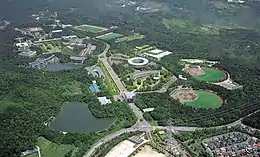
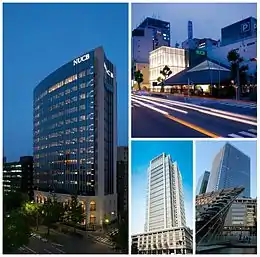
By 1953, the school was chartered as Nagoya University of Commerce and Business. The university was accredited by AACSB International (AACSB) in 2006 and later, its business school, was accredited by the Association of MBAs (AMBA) in 2009 and followed by EQUIS in 2021, thereby becoming the first and only institution in Japan to be accredited by three of these accreditation boards. NUCB continued the pursuit of its internationalization goals with its exchange programs. Reflecting the needs of English undergraduate education in Japan, NUCB is the only university to offer an English Global BBA track, which started in September 2018.
History
As one of the first Japanese citizens to study abroad in Canada, Dr. Yuichi Kurimoto enrolled into the University of Alberta in 1926. After graduating in 1930, he returned to Japan with the vision of making education accessible to the disenfranchised youth of the time.[2] Following the post-war economic and population boom in the 1950s, he established the Nagoya University of Commerce and Business.
Founder
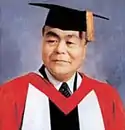
As a student in Canada during a time when Canadians themselves were opening up the western frontier, Dr. Kurimoto first adopted the slogan "Frontier Spirit". Returning to Japan with this ideal, he envisioned an educational institution that would 'create leaders rather than followers, to nurture young persons who think creatively and independently and to impact to students the skills and qualities they will need to become pioneers of the future.'[3] In 1953, the Nagoya University of Commerce and Business was officially set up along with the establishment of the Department of Commerce under the Faculty of Commerce.[4]
In 1968 the school was relocated to Nisshin, Japan. The main campus, Nisshin Campus, is approximately 1.5 times the size of Tokyo Disneyland, making it the largest property owned by a private university in Aichi Prefecture. In 1976 the Computer Center opened and followed shortly thereafter by the Central Information Center (CIC) in 1978. The CIC holds over 220,000 books which are available for NUCB students and faculty for research. More than a university library, the CIC allows students to study independently with modern facilities and resources. The center features a Multimedia Room and is equipped with a Self Access Center (SAC). The General Language Education Center was completed in 1981, serving as the base for foreign language education at NUCB. In 1988, the 'Intelligent School' (IS) Building was constructed to increase the capacity of NUCB students and faculty to access information and enable greater communication between them.
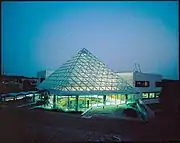
In 1990, NUCB attained government approval to establish NUCB Business School (Graduate School of Management) which marked the establishment of Japan's first postgraduate institution in Management Information. Initially, the school offered a two-year, full-time MSc in Management. NUCB Business School was located at the Nisshin Campus until 2001 when it moved to the newly constructed Fushimi Campus in downtown Nagoya. By 1998 various initiatives were launched at NUCB as part of a major internationalization expansion. The Faculty of Foreign Languages and Asia Studies was established along with the Frontier Spirit Program – a new study abroad program for Japanese students. NUCB expanded the number of courses related to developing communication skills in English and Information Media, and even included a unique course in psychology that acknowledged the behavioral and cultural challenges of effective international communication.[5] Additionally, the Center for Global Communication (CGC) was established to provide support for Japanese students with international ambitions.
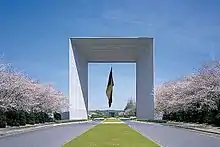
The start of the 21st Century at NUCB was celebrated by the completion of the Millennium Gate at the front entrance of the Nisshin Campus. This was followed by an even greater expansion of the graduate school in terms of the number of departments, degree programs offered, and space. Additionally, the 'Gap Year Program' was implemented to provide students with better opportunities to gain life experiences after enrollment. One of the first of its kind in Japan, NUCB students could spend nearly three months abroad to engage in independent research or volunteer-related activities. Support from NUCB includes scholarships and loans with no interest, as well as conducting seminars on adjusting to life overseas.[6]
Expansion of NUCB continued in 2007 with the opening of the Faculty of Management and in 2008 with the Faculty of Economics and Department of International Studies. In June 2015, NUCB Business School celebrated the opening of the Nagoya Marunouchi Campus in downtown Nagoya to provide space for the ongoing domestic and international expansion of the graduate school.
Administration and organization
Governance
Kurimoto Educational Institute (学校法人栗本学園, Gakkō hōjin kurimoto gakuen), abbreviated as KEI, is the parent organization of Nagoya University of Commerce and Business undergraduate and graduate schools. Additionally, KEI operates an international junior and senior high school located in Showa-ku in Nagoya.
Undergraduate school
The undergraduate school is divided into four faculties – the Faculty of Management, Faculty of Economics, Faculty of Commerce, and Faculty of International Studies.
Academics
- Faculty of Management (EN/JP)
- Department of Management – BBA
- Department of Management Information Science
- Faculty of Economics (JP)
- Department of Policy Management
- Department of Economics
- Faculty of Commerce (JP)
- Department of Marketing
- Department of Accounting & Finance
- Faculty of International Studies (EN/JP)
- Department of Global Business
- Department of English Studies
Exchange program
NUCB offers an all English-speaking program through its faculties called the Global BBA Program (GBBA) which is one of the largest English-taught business programs in Japan. As part of the program, students are able to select between twenty and twenty-five courses from various business topics to liberal arts studies including Japanese culture and history.
Campuses
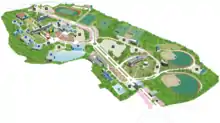
The Nisshin Campus opened in 1968, fifteen years after the formal establishment of NUCB. Nisshin, located just east of the city of Nagoya, sets a rural backdrop for the campus facilities that resembles many American and European university campuses. Visitors are immediately welcomed by the Millennium Gate and massive university flag as they enter the campus. Nisshin Campus houses a central administration office with a Mosburger and 7-Eleven on the ground floor. Nearby, the Community Pavilion hosts space for meetings, dining occasions, and entertaining special guests to the university. Spread out all over the campus, academic buildings include lecture halls, classrooms, and research centers as well as the IS Building, the Center for Global Communications, the Central Information Center, the General Language Education Center, and the International Exchange Center. Furthermore, the campus includes full athletic facilities to support the many sports and clubs at NUCB. These include two baseball fields, seven tennis courts, a soccer pitch, an American football field, an archery range, a pool and gymnasium.
Timeline of key events
| Year | Undergraduate School | |||
|---|---|---|---|---|
| 1935 | Nagoya Railway School established by Yuichi Kurimoto | |||
| 1950 | Koryo International College established | |||
| 1953 | Nagoya University of Commerce & Business established with Faculty of Commerce | |||
| 1968 | Campus location gradually moved to Nisshin | |||
| 1984 | Faculty of Management Information developed | |||
| 1985 | Faculty of International Economics developed | |||
| 1992 | Established an exchange partnership with the Chinese University of Hong Kong | |||
| 1993 | Established an exchange partnership with Chulalongkorn University of Kingdom of Thailand | |||
| 2004 | Faculty of Accounting & Finance developed | |||
| 2006 | Officially accredited by AACSB International as the first undergraduate school to be accredited in Japan | |||
| 2016 | Japanese BBA Program developed | |||
| 2018 | English Global BBA Program developed | 2021 | Officially accredited by EQUIS International |
NUCB International College
NUCB International College is the affiliated boarding high school of NUCB. It is an English-speaking, co-educational institution running to the European/North American academic school year (Sept-June). Upon completion of the three-year programme, graduates will have the opportunity to graduate with two high school diplomas for matriculation to international and domestic Japanese universities. NIC holds International Baccalaureate (IB) World School candidate status* and is aiming for full authorisation by 2023 to deliver the academically prestigious Diploma Programme (DP). NIC is accredited by the Boarding School Association (BSA) and the Australian Boarding School Association (ABSA).
Enrolment
Opening in September 2022 with the Year 10 level of entry first, NIC will gradually welcome up to 75 students for each year of study, for a maximum capacity of 225 students within a 2024 timeframe. Each year level will be divided into up to 3 classes of 25 students.
College rogramme
- Pre-International Programme
The Pre-International Programme in Year 10 leads to the International Programme in Year 11–12. It serves as preparation for the academically challenging International Baccalaureate (IB) Diploma Programme (DP). The approaches to teaching and learning for the IBDP are introduced to the students at this level along with fundamental academic skills and knowledge development so that students are able to commence the IP with a degree of confidence. This year also simultaneously covers the subject requirements for the Japanese national curriculum to enable students to graduate with both the IB and Japanese high school diploma upon the completion of their studies.
- International Programme
The International Programme is a highly academic two-year high school programme of study for students aged 16-19, covering Years 11 and 12, leading to the International Baccalaureate (IB) Diploma. Along with the traditional subjects, the Programme also incorporates a learning approach that assists to enhance analytical, research and people and self-management skills across the curriculum in practice and application. The learning in the programme is driven by case method approaches to teaching and learning and, at the completion of the programme, students are expected to emerge as well-balanced, internationally-minded and highly-skilled individuals.
- Bridging Programme
NIC offers the Bridging Programme to enable the most effective use of students' gap time following their graduation from middle school and to prepare them for September admission. For Japanese students, the BP assists in raising students' English up to a suitable starting level for the College programme, and in bridging some of the learning approach and knowledge gaps that exist between the Japanese and IB educational systems. For students coming from overseas, Japanese language classes are also offered to help students adjust to the culture in a more expedient manner, and also better prepare the student for that language option in the College Programme.
Boarding environment
- Campus environment
NIC is situated on the beautiful 200-acre, wooded grounds of Nagoya University of Commerce in Business located in Nisshin City, which borders the Aichi prefectural capital of Nagoya City and its 2.3 million residents. While the College will have its own dedicated school building and boarding facilities in a self-contained and secure environment, its students and staff will also benefit from access to the university sports facilities, library, restaurants and other amenities.
- School building
Students enter the four-storey building from the entrance located in the basement. The first floor accommodates the atrium lobby in the centre, the administrative office, the music room on the right and the audio-visual classroom on the left. On the same floor, the Carousel appurtenant to the main building will host a library and study rooms, a dressmaking room and a cooking training room. The library will have about 1,300 references. On the second floor are regular classrooms and the teachers' room. The general design of a regular classroom includes a blackboard and a monitor placed in the front, completed with a whiteboard on the side. The student seats are arranged in a horseshoe-shaped layout to accommodate discussion-based Case Method classes. The teachers' room is separated from the corridor by a glass partition, creating an open and airy space, designed to allow students and teachers to interact more closely with each other. A Japanese-style room is also made available at the Carousel for the practice of Japanese traditional arts such as Calligraphy or Ikebana. On the third floor, in addition to the regular classrooms are the science and art rooms. The science room is equipped with a large draft chamber for experiments, an emergency shower, and other facilities similar to a university laboratory.
- International House
NUCB International House is the boarding facility of NIC. The first floor is a shared area. Students can meet their parents or other guests at the lounge located on that floor. The entrance opens on an inner courtyard designed to be used for activities as well as for practising and holding presentations such as plays and concerts. The dormitory rooms are separated into two floors for girls and boys and security gates at the entrance to each floor prevent non-residents of the floor from entering. There are 30 student rooms on each of the 1st and 2nd floors. Each 40 m²-bedroom is designed to be shared with 4 students. They are fully furnished with bunk beds, a large individual storage space with a safe and central study space. A shower room and an alcove space are also included in each room. Boarding facilities include also a nurse's office, a self-study room, a multi-purpose room, a dining room, a laundry room, a cooking lab, and a library.
Future pathways
Students studying at NIC are able to graduate with two high school diplomas for matriculation to international and domestic Japanese universities. NIC graduates also automatically qualify for a conditional offer to the Global BBA of its affiliated university NUCB Undergraduate School.
Support programmes
All education professionals at NIC are qualified and experienced teachers representing a wide variety of cultures and perspectives. They hold Master's level degrees or above and have previously worked in an international context.
- Engage Programme
The Engage Programme is designed to provide students with a variety of relaxation options after classes and prior to the evening meal. This promotes a balanced approach to student life at NIC and allows students to explore and experience different physical, creative and sedentary pursuits over the course of the week. It also provides them with leadership opportunities and assists in building friendships and collaboration skills with other students of different year levels. All participants are encouraged to participate on the basis of complete equality and privileges and authority based on seniority are strongly discouraged. Activities available on the Campus include Football, Basketball, Tennis, Golf, Karate, Badminton, Volleyball, Table tennis, Baseball, Athletics, Fitness / Aerobics, Weight training, Touch rugby, Dancing, Photography, Kanji Calligraphy, Manga, Creative writing, Leadership, Meditation, Public Speaking, Yoga, Band, Chess and Ikebana.
- Well-being Programme
The Well-being Programme is designed to proactively support students on their journey from Year 10 to Year 12. It revolves around a series of Saturday workshops run by the Guidance and Well-being team to reflect on their current situation, according to the school timeline, and assist them with such things as their transition to Japan, Nagoya and the school, social and self-management skills and examination preparation strategies etc.
NUCB International College is a candidate school for the Diploma Programme. It is pursuing authorisation as an IB World School. IB World Schools share a common philosophy – a commitment to high-quality, challenging, international education – that we believe is important for our students.
Only schools authorised by the IB Organisation can offer any of its four academic programmes: the Primary Years Programme (PYP), the Middle Years Programme (MYP), the Diploma Programme (DP), or the Career-related Programme (CP). Candidate status gives no guarantee that authorisation will be granted.
NUCB Business School – Graduate School of Management
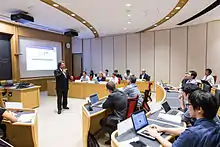
NUCB Business School offers an Executive MBA aimed at working students. The number of students enrolled by 2015 in the graduate school was more than 430, making the NUCB Business School one of the largest business schools in Japan. As of 2021, the international school numbers continue to decline, however they remain ambiguous as the partner school exchange program numbers are combined with Degree seeking International MBA students.
Academics
- Executive MBA
- MBA (EN/JP)
- Master in Management (EN)
- MSc in Taxation
Exchange program
The School offers an English-taught curriculum for exchange and double degree students. Involving over fifty different business courses from full-time faculty as well as guest professors from its partner schools, the program utilizes the case study method to facilitate the exchange of diverse student backgrounds and perspectives.
Campus
Located just a few blocks from the Fushimi Campus, the Nagoya Marunouchi Tower Campus is closer to Nagoya Station and boasts a much greater range of facilities. The fourteen-floor sky-rise holds auditorium style classrooms modelled after Harvard Business School, business suites for professional use, a basement fitness room, and a large hall that holds three hundred at the top floor.
 Nagoya Marunouchi Campus |
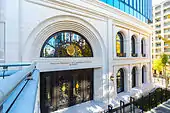 Main Gate |
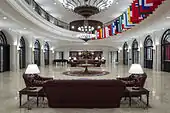 First Floor Entrance |
 Conference Floor |
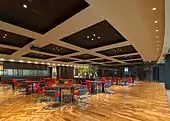 Learning Salon |
 Research Center |
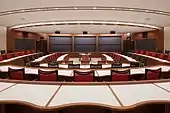 Auditorium |
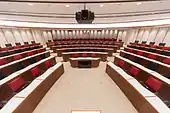 Large Auditorium |
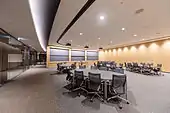 Idea Room |
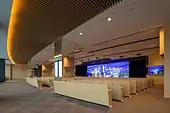 Theater Hall |
Timeline of key events
| Year | NUCB Business School |
|---|---|
| 1990 | Graduate School (the first postgraduate institution in Management Information in the country) established |
| 2000 | 1-year postgraduate program in Information Technology |
| 2000 | Satellite campus in front of Nagoya station |
| 2005 | Global Leader Program – all English MBA Program start |
| 2005 | MBA program launched in Tokyo Marunouchi Building |
| 2006 | Officially accredited by AACSB International as the second institution to be accredited in the country after Keio University |
| 2007 | MBA program launched in Osaka Umeda campus |
| 2008 | Officially accredited by Association of MBAs as the first institution to be accredited in the country |
| 2010 | Global Center was established in Chikusa-ku, Nagoya |
| 2015 | Grand opening of Nagoya Marunouchi Tower campus |
| 2021 | Officially accredited by EQUIS |
Student life
University residences
NUCB has three primary residences for international undergraduate and graduate students. The Meito and Chiyoda residences are named after their location in Nagoya while the Global Center is named for its intent to act as a shared living space for international exchange students in the graduate school. The Meito Dormitory was completed in 2011 and has 198 single, fully furnished rooms. Both regular Japanese undergraduate students and exchange students live in Meito. Chiyoda Dormitory is located much closer to the center of Nagoya city, positioned between the Tsurumai and Kamimaezu stations of the Tsurumai Line. As of 2021, students have avoided long term stay in Chiyoda as the NUCB international staff has insisted it is not their responsibility to maintain the property, and it has fallen into disrepair. Both international and Japanese undergraduates and graduates take residence at Chiyoda while studying at NUCB, though it now sits mostly unoccupied (2021). Nearby attractions include Tsurumai Park, Osu-Kannon, and the entertainment and shopping district Sakae. The NUCB Global Center is located in the Higashiyama area of Nagoya. The Global Center was specifically designed for international graduate students by NUCB. It completed in 2010 with an elegant, modern Japanese design. The residence facility includes 44 single rooms, a seminar room, library, and fitness center. The Higashiyama Zoo and Botanical Gardens is in the surrounding area of the Global Center.
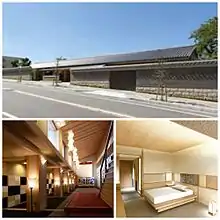 Global Center |
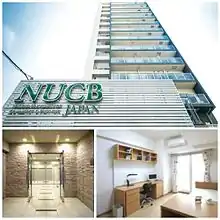 Chiyoda Dormitory |
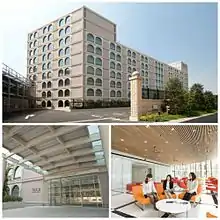 Meito Dormitory |
Student organizations

NUCB has over 50 sports and culture clubs based at the Nisshin Campus. On the day of the matriculation ceremony, these groups set up tables in the center of campus to attract new members. Some of the most popular clubs include baseball, golf, judo, and brass band.
Sagamine festival
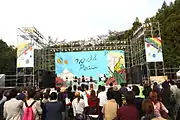
The Sagamine Festival is held annually during the third week of October. The event is organized entirely by NUCB students and held at the Nisshin Campus. Activities include a variety of culturally themed booths, entertainment, and performances. Each year famous music artists are invited to perform in a concert held on the first day. On the second day, a talk show is held with a Japanese celebrity acting as the host. Past acts at the Sagamine Festival include Exile (Japanese Band), Funky Monkey Babys, Daigo, and Mari Yaguchi.
On the evening of the final day, the 'Night After Festival' is held. A campfire talk-show is hosted by a different Japanese talento and concludes with a fireworks display. Previous hosts have included comedy duos like Bananaman (comedy duo) and models such as Maggy (model).
Notes and references
- "Master Studies; NUCB Business School". MasterStudies.com. Retrieved February 5, 2016.
- "University Description". Eastchance.com. Retrieved February 5, 2016.
- "The Founding Spirit". NIHS. Retrieved February 7, 2016.
- "International Guidebook". www.nucba.ac.jp. Retrieved February 7, 2016.
- "International Communication Program". Koryo International College of Japan. Retrieved February 7, 2016.
- "More universities offer 'gap year' programs". The Mainichi. Retrieved February 5, 2016.
